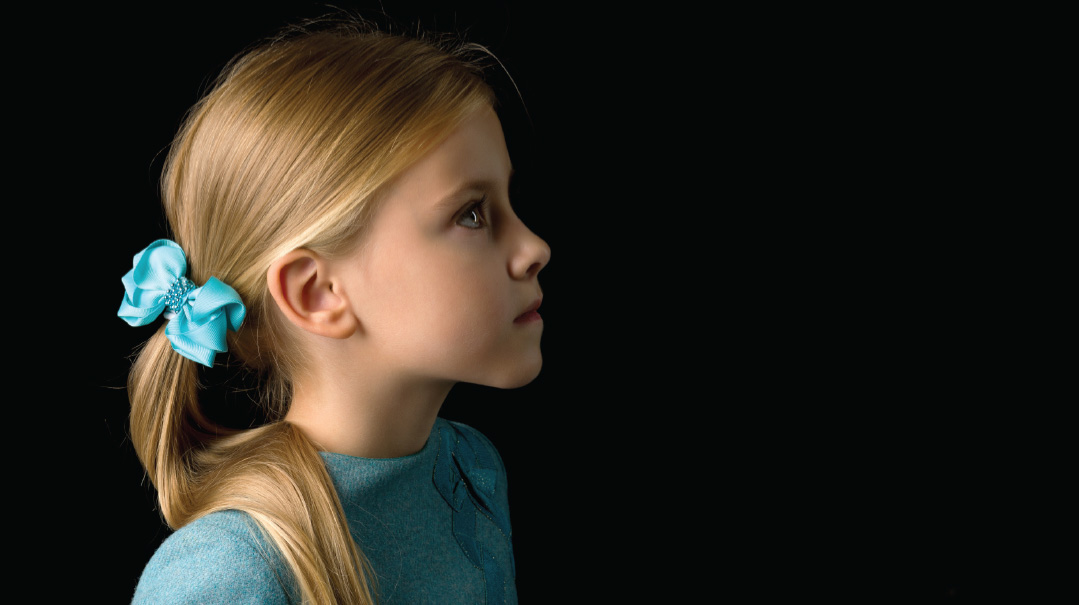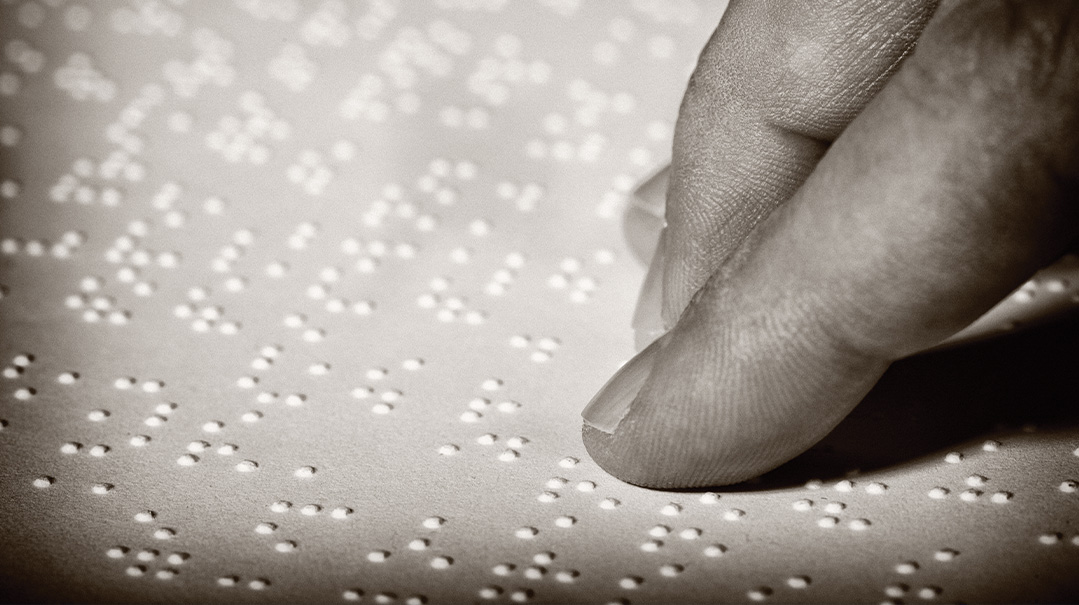Where Are You?

I was leaving all my friends behind. Except Eliana. And yet high school, it seemed, had no room for her

As told to Devorah Grant
I
’ve known Eliana ever since I was the new girl in Bais Rivka, seven years old in the back of a classroom, where everyone was reading Rashi. I’d never learned Rashi before. Nor, so it seemed, had Eliana. She swung on her chair in a carefree manner, and told me that she had recently moved, too. A kindred spirit. I rapidly settled into school, making friends with Riva, Shayna, and by extension, Efrat, too. My closest friend was Riva, whose warm nature made me feel right at home. But Riva and I were split for most of our classes. While I was in class A for English and Math, she was in class B; while I was stuck struggling to understand Rashi and Chumash in a group of weaker students, she was in class with my favorite teacher. That’s why I ended up spending so much time with Eliana. Poor souls with imagination and so many questions, we wondered why we were chanting words and translation, what on earth was a shoresh, and when would someone realize that neither of us had the foggiest clue how to learn this way. But no one did.
I knew Eliana was different. She had a dreamy air in her clear-as-glass eyes, an engaging smile and a complete cluelessness which turned me in to more of a mother figure, even at that age. She entertained me with her endless tales about her family and her out-of-the-box thinking. Sometimes, her messiness and naïveté annoyed me. Like when she’d leave everything in another classroom and have to borrow a pencil; or when she couldn’t find her books in her messy desk. My desk was stacked in perfect order. I just didn’t get it. But time moved on this way. We were always different.
Three years passed, and it was time to go to high school. I was leaving all my friends behind. Except Eliana. And yet high school, it seemed, had no room for her.
I struggled my way through high school and somehow made things work. Eliana did not. I watched, cringing, as the sweet friend I knew turned into a lonely, sad shell of herself, with a jarring lack of understanding of our new environment. But I felt powerless to help. My conscience would sting and I would try to include her. And yet I wasn’t strong enough to help her all the way, and she suffered.
In later years, I started to grow more into myself. I realized I could be funny and artistic; could dance well, could gain friends by being patient and persevering, and could grow a skin thick as an elephant’s hide to prevent myself from getting hurt. But Eliana was still stuck.
I was friendly with many, had people to talk to, and had one teacher who I knew understood me. But it was too late for Eliana. She was too strongly entrenched in her habits by now; she was different and people didn’t get her. And though I did, I couldn’t show that enough. She started dressing more inappropriately, and though she davened like a true tzadeikes, I saw questions in her eyes, and so much pain.
One evening, in 11th grade, I phoned Eliana to ask her about some homework, and stayed on to chat. What she told me made me shake. She told me that she hated life and school and the world. I heard her emotions, her questions, her fears, and was completely and utterly overwhelmed. Yes, I was often the listening ear for people who needed it. No, I could not handle this.
I tried to share all of this with an adult. She asked me to stay in touch with Eliana, while she tried to help in other ways, and I said I would. But most importantly, I said, Eliana must not know I had told her. She gave me her word.
She kept her word, and so did I. But Eliana continued to suffer. I watched her getting angrier and lonelier and openly defiant. Nobody could stop her. It hurt to watch.
It was time to make seminary choices. Eliana wanted to go to somewhere different; to leave all her classmates behind and go somewhere where a box didn’t define her. But her mother, a sweet woman, liked me and wanted Eliana to join me. She didn’t want her daughter to have the reputation as the girl who went to the other type of seminary. The plan worried me. I was afraid Eliana would be a burden.
The first few weeks of seminary were bedlam. Though I went with six classmates, they quickly became swallowed up in the noise and chaos of 100 girls. Yet amongst all this, Eliana was seemingly successful. People liked her — she dressed beautifully, had a gorgeous smile, and wouldn’t hurt a fly. Maybe, I hoped, this would be Eliana’s chance for a new start.
Meanwhile, I made a new friend, Mimi, who loved to paint, and she offered to teach me. Ten lessons, and many weeks later, we were very close. I had Mimi now, and Eliana faded slightly into the background. It was only because Mimi understood me better; we had a common language of struggle and survival and courage, and of dance and paint and song. It was a shock for me to meet someone who had similar interests and a unique sparkle. Someone who cared deeply about people, and wanted to change the world. Someone like me.
Slowly, I drifted away from Eliana. She never showed she was jealous, or begrudging of my friendship, which soon multiplied into one, two, three more new friends. And yet, I knew it must be hurting her. I tried to include her. I had great roommates, and I would encourage her to come and sit as we’d laugh and have ridiculous conversations. But she knew, she wasn’t really part of this. I was building myself a new life, and she wasn’t. Her attraction among other girls hadn’t lasted. Although she looked the part, people found her too unusual and she was left alone, again.
I davened for her constantly, asking Hashem to give her friends, not me. She needs them more, I’d explain; I had school friends and talents. But she needed not to be let down again. I felt it. And at some point, things did change. My group of friends expanded, and she became part of us. Now Eliana belonged; I’d achieved my goal. I was much more secure, and found myself talking to most people, making more friends and leading numerous events. My relationship with Eliana kept deepening. We’d have philosophical conversations; about people, about emunah, about our lives. We laughed, cried, and shared so much. I encouraged Eliana to ask for help; getting her to articulate the questions she never knew she had, and showing her how nobody would look down on her for reaching out. And she seemed, for a while, on an upward trajectory. Until Dina came along.
I didn’t like Dina. She was a whirlwind of rebellion and it was awful to watch her hold on Eliana. The downward spiral happened fast, and my other friends and I watched with sadness. But it hurt me the most.
Eliana stopped davening, her dress changed; she’d disappear to unknown places leaving me in the dark. Yes, by this point I had plenty of people for company. But I missed Eliana.
We patched up our relationship slowly, with a Band-Aid covering up the huge, deep wounds temporarily. I tried to go with the flow, and take whatever I could, but Eliana’s spiritual choices made me sad.
We left seminary and Eliana left Dina behind. Eliana started sharing with me again. But what I heard was concerning. She gradually made less and less of an effort to overcome her struggles. I was still trying to grow and bring her along with me, but she was becoming hard to handle.
Eliana decided she needed to travel. She made choices I disagreed with; things which undermined her Yiddishkeit and identity, and reduced her ability to choose until she felt like a victim. And in some ways, I was already grieving for her.
When I spoke to her on the phone, she sounded amazingly happy. I only spoke to her twice. Both times I needed a good hour of conversation with someone wise to talk through the confusion I experienced; about how her emotions and Yiddishkeit seemed too tangled and how the dissonance between what she was saying and her actions made me worry.
And then, last week, she sent me an email. She was coming home. I waited for her to make contact, almost certain that it was bad — I could feel it. And it was. She called me on Thursday. Her voice had open challenge in it; she told me she was dropping everything, that she “can’t do” Yiddishkeit anymore. I had known this was coming. I knew.
Hashem helped me. I felt strangely detached, apart from when she spoke about her parents’ pain, and that made me break. I simultaneously hated her and pitied her, that she was in so much pain to take this step.
Hashem gave me the words to respond the way my rav had said, since I thought I needed to still have contact with her so that she would know there is someone frum who hasn’t rejected her.
I told her that the human experience of pain is universal; that I could connect to her since I had struggled, too, and I can feel how much pain she must be in. She was grateful. Her defenses melted, and she said she hoped our relationship could still be okay. As she said this, I resolved in my head to daven for her and her parents, and to ask for guidance. But most of all I wondered: how long would it take until she was really okay enough for it to be okay?
I’m sad now. Our decade of friendship is reduced to a thin thread of so much love, and so, so much pain.
And meanwhile, something inside me is still searching, for that little Eliana, sitting at the back of a classroom, where two friends shared a world.
(Originally featured in Teen Pages, Issue 931)
Oops! We could not locate your form.







